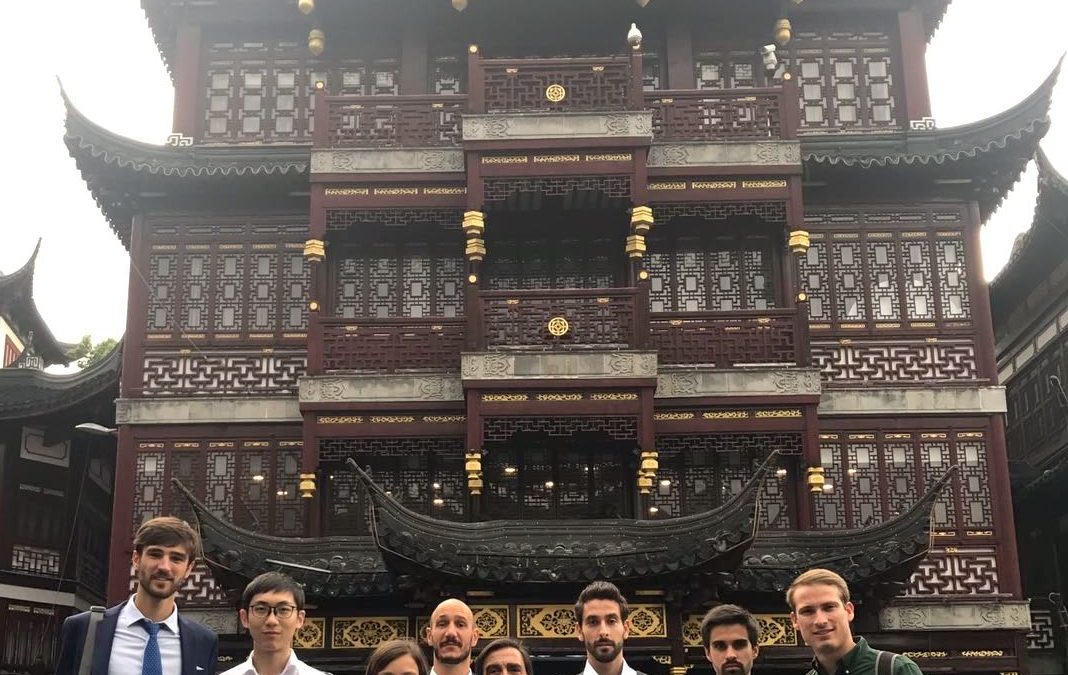
by holiveira | Oct 11, 2017 | Corporates
Startup culture has its own language. Many of the terms tossed around sounds like something out of a Sci-Fi movie, or an episode of ‘The Big Bang Theory’, at the very least…
In fact, hearing the language of startups is a lot like watching a foreigner that kind of speaks Spanish trying to have a go at Portuguese. Some words you almost recognize, others you get a sense of what they’re hinting at. But it really doesn’t amount to anything, if you’re looking for your native tongue.
The truth is, most of these terms have come to stay. So there’s really no use in trying to swim against the current and ignore them. The innovative businesses popping up every week, feed and bask in this new ‘lingo’, so, if you want to bring your organization closer to innovation and growth, you better start by understanding what promising startups are actually talking about.
So, to help you get started, here are some key jargon:
Incubator: A space for businesses to research, gestate, and grow before attempting to hit the market. Think about a species of animal that can stand as soon as it is born and then walk and jump 24 hours after. OK, so that is not the type of animal that belongs in an incubator. Incubators are good for seed stage companies, that really need more time and care. Incubators are often also coworking spaces.
Accelerator: An accelerator is much like an incubator, but with more access to resources, mentors, know-how, investors, and corporate connections. In an accelerator, a company might outgrow its natural pace, hence the ‘acceleration’. Accelerators are spaces that have the resources to help a startup fail and try again.
Pitch: A presentation in which a startup founder attempts to persuade an investor about the viability of their company. The presentation varies, based on the specific purpose of the pitch. Brief presentations in which an entrepreneur provides a 30 – 60-second overview of their idea, business model, and marketing strategy, with the purpose of attaining a followup audience with an investor are described as ‘elevator pitches’. Formal, detailed presentations utilizing power point type slide decks, with the specific objective of seeking investment from angel groups or VCs, are known as ‘investment pitches’, and usually, amount to 3 minutes.
Burn Rate: The rate at which a company spends net cash over a certain period, typically a month. Investors are not very keen in putting their money where the burn rate is excessive, apart from some few exceptions, like Uber. In simple words, its how fast startups are blowing the cash they got in the first place.
Seed Money: The first investments in a company by someone other than the founder. The term comes from planting a seed for the first time. This is the initial round of capital for start-up companies, typically provided by angel investors through preferred stock or convertible bond-type instruments.
Unicorn: A company that has magically been valued at over $1 billion (1 million millions). Curated fashion platform Farfetch, founded in Portugal, is one such example. It’s a steep road, but all startups dream of becoming Unicorns…
You are now ready to enter the world of startups. But tread lightly, it a chaotic space, constantly changing and evolving. If you need some guidance, Beta-i is always here to help you navigate the entrepreneurial ecosystem.

by mafaldachaves | Oct 11, 2017 | Corporates, Startups
In 1964 someone said there would be no market for television.
“Television won’t be able to hold onto any market it captures after the first six months. People will soon get tired of staring at a plywood box every night.”
This was no other than… Daryl Zanuck, the co-founder of 20th Century Fox, one of the biggest producers of televised content.
Let me give you another example.
“I think there is a world market for maybe five computers.”
Said Thomas Watson, president of IBM in 1943.
More recently, someone had hesitations about the first iPhone at its launch.
“500 dollars? I said that is the most expensive phone in the world. And it doesn’t appeal to business customers because it doesn’t have a keyboard.”
This was Steve Ballmer, CEO of Microsoft in 2007.
What can we conclude from these incidents?
- As a CEO or co-founder of a large company, if you sound confident, you can say whatever you like!
- But also that the future is very unpredictable, and increasingly more so. When it comes to technological innovations and digital transformation, not even those with access to information on industry knowledge and trends or current industry leaders can anticipate what is going to happen.
As the speed of change increases, unpredictability is becoming the norm rather than the exception. This game of trying to predict the future is getting old. It’s almost turning mystical, like looking into a crystal ball. It has become too risky for most companies to put all their bets on these unreasonable certainties.
Nowadays, with so many future possibilities, the only way for an organization to remain competitive is through a continuous desire to learn and a willingness to test things.
It no longer makes sense for a company to look inwards, to what is known and familiar, in search of innovation and transformation. Or even to focus on developing new solutions and technologies in-house. Most of the ideas that arise, probably have or are being developed by someone who more focused and specialized. Most of the time, these teams are startups looking for opportunities to collaborate and who dream of seeing their solutions used by customers.
Companies possess industry knowledge, resources, access to a large customer base, but they seek new ideas, the opportunity of testing and experimenting without too much risk and becoming agiler to be able to do this. That is exactly what startups have to offer. In turn, they are looking for industry knowledge, resources, and access to a large customer base. All things that corporates can offer.
If these two happen to have a profile on Tinder, I’d say it is a perfect match. But as you know, even for the perfect match, relationships are never easy!
This is why at Beta-i we have open innovation programs. We do what tinder does. We facilitate these “dates” between startups and corporates. Through our programs, clients can attract the most innovative ideas, from all over the world, technology-based startups, who are excited and ready to collaborate and adapt their solutions to your business reality. Our programs, which often happen at a global scale involve the entire organization and bring together diverse business areas to create interdisciplinary teams. This way we foster an environment for deep cultural transformation to occur in a natural way. And it really works! Our clients can prove it.
There’s one last statement, that I’d like to share with you.
“Neither Redbox nor Netflix are even on the radar screen in terms of competition.”
Can you guess who this was? You’re right, it was Jim Keyes, president of Blockbuster before it’s doom!
Had blockbuster collaborated with Netflix or Redbox, or other startups of the sort, they could now be one of the biggest providers of online entertainment content.
Don’t make the same mistakes that were made in the past. It’s time to collaborate with startups and not miss the opportunities of the future!
If you want to know more about our open innovation programs, have a look here!

by amalienaustdal | Oct 10, 2017 | Corporates, Investors, Startups
Frank Borman, a retired NASA astronaut, once said: ‘exploration is really the essence of the human spirit’. Now, you don’t have to go all the way to space for exploration. There are plenty of wild and unexpected adventures made possible by a short flight. It seems like more and more people share the beliefs of Frank Borman. Nowadays, more people are traveling, going to far-away destinations, whilst seeking more immersive experiences.
More than ever, we are looking for ‘exploration’ and not just ‘holidays’. It is changing the face of the travel industry. New niches are being created, with new solutions entering the market. Three core themes driving the disruption of the industry are demand for sustainability, future traveler’s needs and innovation.
Sustainability
Not only have we become more aware of making our travels a lasting memory, we are also seeking to make a positive impact on the destination we travel to. The travel industry has become the largest industry worldwide, increasing our responsibility to protect and preserve the places we love to explore. Travelling is associated with a large carbon footprint and the derogation of natural and cultural heritage. As we are becoming more aware of this, travelers are starting to demand green and sustainable alternatives at every step of the journey. Now, 70% of travelers expect companies to demonstrate a commitment to preserve the natural environment. Many local and national economies rely on tourism, yet many are starting to realize the negative impact of tourism. Spain is a prime example of a country struggling with mass tourism. Forcing the nation to take constricted action to reduce the number of visitors in its most popular destinations. Thus, there are many changes being made in the industry; new regulations, innovative technologies and sustainable alternatives to combat the bad rep of traveling as an environmentally polluting activity.
The Future Traveler
Travel is about consuming experiences, and we all want a unique experience tailored to ourselves. Technology is making this possible. In turn, technology is making the needs of the future traveler more complex and higher than ever. We want more out of each experience. Each encounter on the travel needs to be unique, memorable, adventurous, effortless and personalized. The future traveler has technology at their fingertips, with access to personalized information, whenever, wherever. Before the trip, technology allows for a more seamless integration of planning tools for easy booking of hotels and add-ons tailored to your interests. During the trip, the connected traveler can easily navigate their way through the final destination and easily discover the offers around you. As a result of social media, the future traveler is seeking unique experiences, going off the trail for a killer image. It is no longer possible to satisfy the needs of the future traveler without innovating and offering tailored services to the individual.
Innovation
There are many technological innovations entering the tourism industry today. Crowdsourcing sites with reviews and advice make choosing restaurants and experiences easier. The sharing economy gives rise to new options in accommodation, such as Airbnb and Couchsurfing, as well as cheaper transportation and meal offers. Online platforms are making it easier to plan your holidays. Virtual reality is making it possible to experience your holidays before you go, to get a glimpse into what you can expect. Augmented reality can be your personal tour guide, tailoring the guide to your interests instead of a generic group tour. There are countless new innovations entering the market every day, improving our travel experience throughout the journey.
It is not a coincidence, that these three areas are in fact the three core themes covered for the Lisbon Tourism Summit. The Lisbon Tourism Summit is an event dedicated to the tourism industry; its innovators, challenges, and developments. Seeking to inspire, demonstrate new solutions and bring together key players in the industry.
As a final note, I will leave you with another quote. Some food for thought.
‘The traveler sees what he sees. The tourist sees what he has come to see” – Gilbert Chesterton.

by guest | Oct 9, 2017 | Corporates, Investors, Startups
The second edition of Protechting recently came to an end, with three winners selected for the Roadshow to China. We asked one of the founders of the three startups to report back to us on their experiences in China.
Gonçalo Consiglieri is one of the founders of Visor.ai: a chatbot and human messaging platform. Here is his story from the Roadshow to China with Fidelidade and Fosun.
We had the opportunity to participate in the roadshow to China organized by Fosun for the winners of Protechting. It was an amazing experience for several reasons.
We had the opportunity to meet the Fosun group and their associated companies. This was an amazing opportunity for us to get to know more about the company, their structure, and strategy. They can be a great partner for us in the future, both on the commercial side, and as a possible investor for our company.
This visit allowed us to meet the Chinese market and culture. It introduced us to the main challenges and opportunities, in case we decide to start operating in China.
We got to know more about services and trends leading the future of our sector in China. It was mesmerizing for us to realize the importance of WeChat in China and the multitude of utilities it has, not only as a Chat platform but also as a payment method. There are some possibilities and use cases that we can implement for clients in Europe, and it would also be a possibility to implement our system with this platform in the future.
During the visit, we also participated in an international pitch competition. It took place in the city of Ningbo and was transmitted on national TV. This was an amazing and exciting experience, where we had close contact with Chinese Startups and the ecosystem.
The experiences in China were great for us to enrich our relationship with Bdeo and Amiko, the other winners of Protechting, with whom we are exploring potential synergies. We are grateful to Rita Delgado from Fosun and José Maria Villa de Freitas from Fidelidade that joined us for this incredible experience and did a hell of a job, making us feel great and promoting our projects to the Fosun companies and partners that we met.
After this experience, we truly feel we are better, both as a startup and as people, due to all the experiences we had the opportunity to live and the people that we had the opportunity to meet.
A big thank you to Fosun and Fidelidade for all the opportunities that they gave us not only during this trip, but also since the first moment that we met in Protechting.




